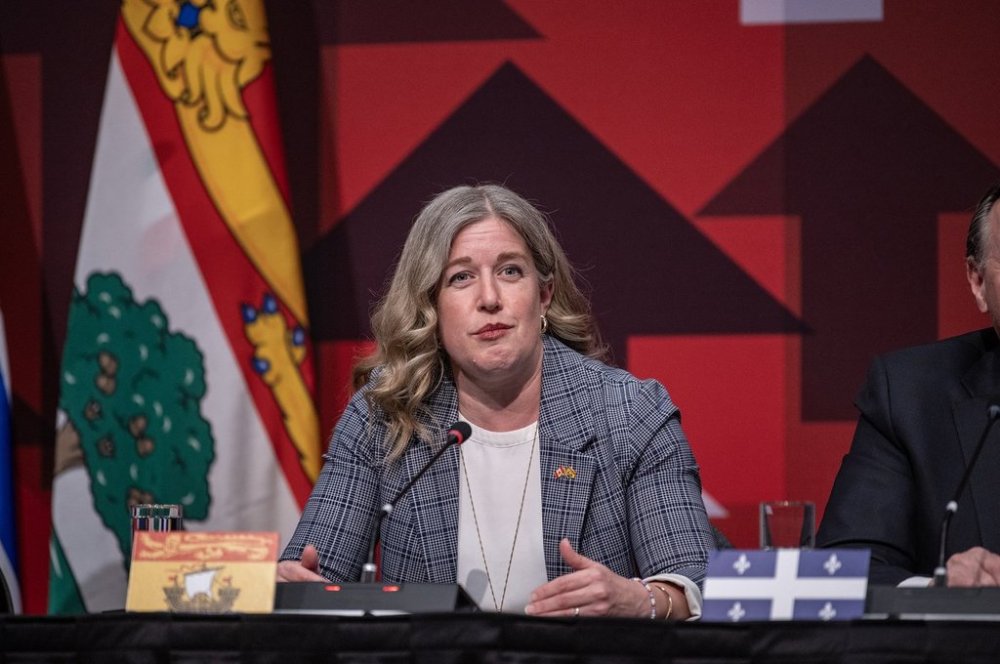N.B. premier Holt says strained relationship between Canada and U.S. Trump’s fault
Advertisement
Read this article for free:
or
Already have an account? Log in here »
To continue reading, please subscribe:
Monthly Digital Subscription
$0 for the first 4 weeks*
- Enjoy unlimited reading on winnipegfreepress.com
- Read the E-Edition, our digital replica newspaper
- Access News Break, our award-winning app
- Play interactive puzzles
*No charge for 4 weeks then price increases to the regular rate of $19.00 plus GST every four weeks. Offer available to new and qualified returning subscribers only. Cancel any time.
Monthly Digital Subscription
$4.75/week*
- Enjoy unlimited reading on winnipegfreepress.com
- Read the E-Edition, our digital replica newspaper
- Access News Break, our award-winning app
- Play interactive puzzles
*Billed as $19 plus GST every four weeks. Cancel any time.
To continue reading, please subscribe:
Add Free Press access to your Brandon Sun subscription for only an additional
$1 for the first 4 weeks*
*Your next subscription payment will increase by $1.00 and you will be charged $16.99 plus GST for four weeks. After four weeks, your payment will increase to $23.99 plus GST every four weeks.
Read unlimited articles for free today:
or
Already have an account? Log in here »
HALIFAX – New Brunswick Premier Susan Holt says U.S. President Donald Trump is squarely to blame for the frosty relationship between Canada and the United States.
Holt met with the three other Atlantic premiers, as well as representatives from four New England states, in Newfoundland and Labrador on Monday.
The group talked about tariffs enacted on both sides of the U.S.-Canada border, as well as collaboration on issues like energy and food security.

Holt says the group touched on a drop in Canadian tourism into the U.S. this summer. She says the extent of Canadians’ anger against the U.S. president over his comments on annexing Canada is being clearly felt.
At the meeting, she says Vermont Governor Phil Scott asked about getting Canadians back to the U.S. “We know the problem lies in the White House and in Donald Trump, and it’s not a beef that we have against our neighbours in New England that keeps us from going across the border,” Holt said.
Scott says the drop in Canadian visits this summer caused a roughly five-per-cent drop in tourism in Vermont.
“Most of us don’t appreciate the way that we’ve been treating our friends across the border,” Scott said to media after the meeting.
“Canadians are more than just our friends. You’re like family,” Scott said. “Tariffs in general are a bad idea because they’re just attacks on consumers. But arbitrarily, increasing tariffs on our closest allies is a terrible idea.”
Holt says that New Brunswick has been dealing with layoffs after it was hit hard by Trump’s 45-per-cent tariffs on Canadian softwood lumber.
Holt has previously said that one in 11 New Brunswickers are employed directly or indirectly by the forestry industry.
But the premier adds that she and her counterparts from Atlantic Canada and New England want to get back to the negotiating table to resolve the trade issues quickly.
“Everyone’s in agreement that we want to renegotiate (the Canada-U.S.-Mexico trade agreement) quickly to try to get this behind us as we work through the sector-specific tariffs as well,” she said. “Every day that we (have) these softwood tariffs is another day of difficulty for New Brunswick.”
The premiers and U.S. representatives also talked about energy, and connections between Canada’s East Coast and New England, to ensure that power could be shared between the two countries as needed.
This report by The Canadian Press was first published Nov. 17, 2025.

